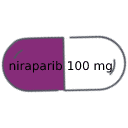Uses
Niraparib is used to help maintain the response of certain types of ovarian (female reproductive organs where eggs are formed), fallopian tube (the tube that transports eggs released by the ovaries to the uterus), and peritoneal (layer of tissue that lines the stomach) cancer in people who have completely responded or partially responded to other chemotherapy medication(s). It is also used to treat certain types of the ovarian, fallopian tube, or peritoneal cancer when cancer has gotten worse after 3 or more chemotherapy treatments. Niraparib is in a class of medications called poly (ADP-ribose) polymerase (PARP) inhibitors. It works by killing cancer cells.
Side Effects Of Niraparib
Niraparib may cause side effects. Tell your doctor if any of these symptoms are severe or do not go away:
- nausea
- vomiting
- constipation
- heartburn
- dry mouth
- sores in the mouth
- loss of appetite
- back pain
- headache
- dizziness
- changes in taste
- difficulty falling asleep or staying asleep
- anxiety
- rash
Some side effects can be serious. If you experience any of these symptoms, call your doctor immediately:
- pale skin
- shortness of breath
- weakness
- tiredness
- weight loss
- bruising or bleeding easily
- blood in urine or stool
- burning feeling when you urinate
- frequent or urgent need to urinate
- fever, cough, runny nose, or other signs of infection
- Niraparib may increase the risk that you will develop other cancers. Talk to your doctor about this risk.
- Niraparib may decrease fertility in men. Talk to your doctor about the risks of taking niraparib.
Niraparib may cause other side effects. Call your doctor if you have any unusual problems while taking this medication.
Warnings & Precautions
Before taking niraparib:
- tell your doctor and pharmacist if you are allergic to niraparib, any other medications, or any of the ingredients in niraparib capsules. Ask your pharmacist for a list of the ingredients.
- tell your doctor and pharmacist what other prescription and nonprescription medications, vitamins, nutritional supplements, and herbal products you are taking or plan to take. Your doctor may need to change the doses of your medications or monitor you carefully for side effects.
- tell your doctor if you have or have ever had arrhythmias (abnormal heart rhythms), high blood pressure, or heart disease.
- tell your doctor if you are pregnant or plan to become pregnant. You will need to have a negative pregnancy test before you start treatment and should use birth control to prevent pregnancy during your treatment and for 6 months after your final dose of niraparib. Talk to your doctor about birth control methods that will work for you. If you become pregnant while taking niraparib, call your doctor immediately. Niraparib may harm the fetus.
- tell your doctor if you are breastfeeding or plan to breastfeed. You should not breastfeed while taking niraparib and for 1 month after your final dose.
Dosage Of Niraparib
Niraparib comes as a capsule to take by mouth once daily. Take niraparib at around the same time every day with or without food. If you experience nausea after taking niraparib, take it once daily at bedtime. Follow the directions on your prescription label carefully, and ask your doctor or pharmacist to explain any part you do not understand. Take niraparib exactly as directed. Do not take more or less of it or take it more often than prescribed by your doctor.
Swallow the capsules whole; do not open, chew, or dissolve them.
If you vomit after taking niraparib, do not take another dose. Continue your regular dosing schedule.
Your doctor may decrease your dose of niraparib, or permanently or temporarily stop your treatment, if you experience certain side effects. Be sure to tell your doctor how you are feeling during your treatment with niraparib.
Ask your pharmacist or doctor for a copy of the manufacturer’s information for the patient.
Other
Keep all appointments with your doctor and the laboratory. Your doctor will check your blood pressure regularly and order certain lab tests before and during your treatment to check your body’s response to niraparib.
In some cases, niraparib may only be used in people with a certain genetic make-up. Your doctor may order a blood test to help decide if this medication is right for you.
Do not let anyone else take your medication. Ask your pharmacist any questions you have about refilling your prescription.
It is important for you to keep a written list of all of the prescription and nonprescription (over-the-counter) medicines you are taking, as well as any products such as vitamins, minerals, or other dietary supplements. You should bring this list with you each time you visit a doctor or if you are admitted to a hospital. It is also important information to carry with you in case of emergencies.
Source
All information has been provided courtesy of MedLinePlus from the National Library of Medicine and from the FDA.



